

The Opposite of Addiction is Connection. Right now an exciting new perspective on addiction is emerging.
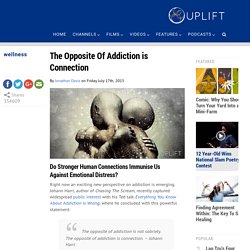
Johann Harri, author of Chasing The Scream, recently captured widespread public interest with his Ted talk Everything You Know About Addiction Is Wrong, where he concluded with this powerful statement: The opposite of addiction is not sobriety. Remaking love: Barbara Fredrickson at TEDxLowerEastSide. Empathy and Ecstacy. The Stimulating Effect of Taking Empathic Action “Society needs to undergo an empathic revolution if we are to survive as a species” says Anita Nowak of McGill University. There is a spectrum of empathy, says Nowak, with pity at one end, empathy at the other and compassion and sympathy somewhere in between. Pity, while being an emotional reaction to someone else’s pain, also involves an element of looking down on people — this is where a lot of foreign aid and paternalistic philanthropy has come from.
Unleashing Empathy: How Teachers Transform Classrooms With Emotional Learning by Lennon Flowers. The secret to learning self-awareness, cooperation, and other “social and emotional learning” skills lies in experience, not in workbooks and rote classroom exercises. posted Apr 04, 2014 Photo by Studio One/Shutterstock.
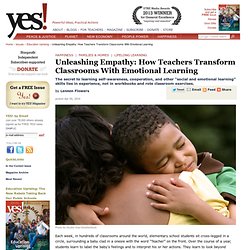
Each week, in hundreds of classrooms around the world, elementary school students sit cross-legged in a circle, surrounding a baby clad in a onesie with the word “Teacher” on the front. The Neurochemistry of Empathy, Storytelling, and the Dramatic Arc, Animated. Why We Love: 5 Books on the Psychology of Love.
It’s often said that every song, every poem, every novel, every painting ever created is in some way “about” love.
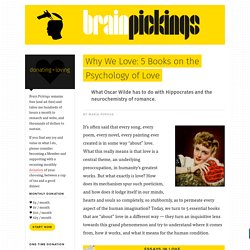
What this really means is that love is a central theme, an underlying preoccupation, in humanity’s greatest works. But what exactly is love? How does its mechanism spur such poeticism, and how does it lodge itself in our minds, hearts and souls so completely, so stubbornly, as to permeate every aspect of the human imagination? Today, we turn to 5 essential books that are “about” love in a different way — they turn an inquisitive lens towards this grand phenomenon and try to understand where it comes from, how it works, and what it means for the human condition. No superlative is an exaggeration of Alain de Botton‘s humble brilliance spanning everything from philosophy to architecture.
Every fall into love involves [to adapt Oscar Wilde] the triumph of hope over self-knowledge. Managing with the Brain in Mind. Naomi Eisenberger, a leading social neuroscience researcher at the University of California at Los Angeles (UCLA), wanted to understand what goes on in the brain when people feel rejected by others.
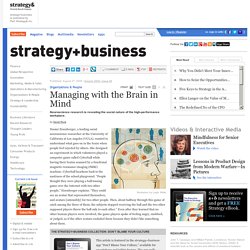
She designed an experiment in which volunteers played a computer game called Cyberball while having their brains scanned by a functional magnetic resonance imaging (fMRI) machine. Cyberball hearkens back to the nastiness of the school playground. “People thought they were playing a ball-tossing game over the Internet with two other people,” Eisenberger explains.
A Scientifically Proven Way To Reduce Stress & Improve Your Health - mindbodygreen.com. I recently wrote about the scientific reasons why you should listen to your heart and not just your brain.

I reviewed data on how the heart sends information to the brain on a regular basis and how the electromagnetic field of the heart is the by far the strongest in the body. Are there any practical implications to these facts? Can you train your heart to control the health and performance of your body in just 10 minutes a day? Yes! But first, let's review the concept of heart rate variability (HRV). Conversational Courage. 7 Scientific Reasons You Should Listen To Your Heart (Not Your Brain) 6 Ways To Slow Down The Speed Of Life We blink and a year has passed.
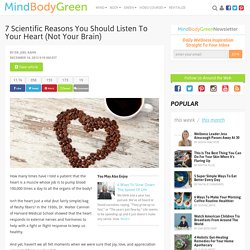
We've all heard or found ourselves saying, "They grow up so fast," or "The years just flew by. " Life seems to be speeding up and it just doesn't make any sense. How Read How many times have I told a patient that the heart is a muscle whose job is to pump blood 100,000 times a day to all the organs of the body?
Isn’t the heart just a vital (but fairly simple) bag of fleshy fibers? And yet, haven’t we all felt moments when we were sure that joy, love, and appreciation emanated from our hearts? New research is showing that the heart controls the brain much more than previously thought. Let’s look at 7 of the most important new findings about the central role of the heart in controlling the mind: 1. There are 40,000 sensory neurons relaying information to the brain from the heart, leading researchers to call the heart the “little brain” and to coin the field as neurocardiology. 2. It does so in four ways, via: 3. 4. 3 Scientifically Proven Ways To Increase Intimacy.
Love can be hard to define.
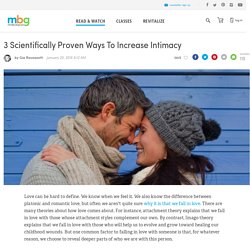
We know when we feel it. We also know the difference between platonic and romantic love, but often we aren't quite sure why it is that we fall in love. There are many theories about how love comes about. For instance, attachment theory explains that we fall in love with those whose attachment styles complement our own. The Science of Love: How Positivity Resonance Shapes the Way We Connect.
What Everybody Needs. How To Rewire Your Brain For Stronger Relationships. So, what does your brain have to do with relationships?
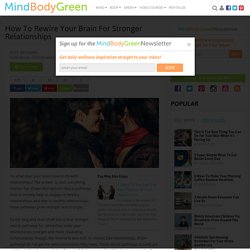
The answer is, well, everything. Science has shown that specific neural pathways exist to actively help us engage in healthy relationships, and that in healthy relationships, those pathways grow stronger and stronger. So the long and short of all this is that stronger neural pathways for connection make your relationships stronger and more rewarding.